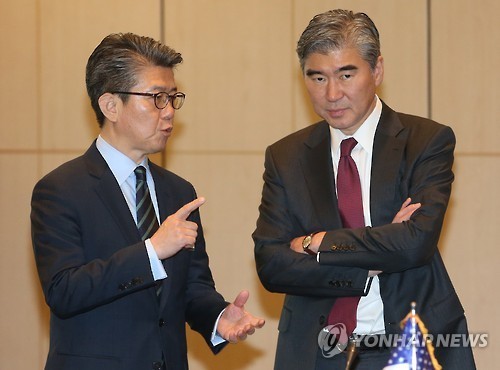China, Russia firms may be subject to U.S. sanctions
By Shin Hyon-heePublished : March 21, 2016 - 16:30
As a majority of North Korean overseas workers are in China and Russia, companies employing them in the two countries may be subject to Washington’s new sanctions, a top U.S. official in charge of sanctions policy indicated Monday.
“The new Executive Order provides very broad authority to deal with the exportation of labor,” said Daniel Fried, coordinator for sanctions policy at the U.S. State Department. “It doesn’t mandate anything in particular, but the authorities are there if needed.”
He was speaking to reporters shortly after ranking officials of South Korea and the U.S. held an intra-agency consultation to explore ways to better enforce their latest unilateral sanctions against Pyongyang and coordinate future policy actions.
“The new Executive Order provides very broad authority to deal with the exportation of labor,” said Daniel Fried, coordinator for sanctions policy at the U.S. State Department. “It doesn’t mandate anything in particular, but the authorities are there if needed.”
He was speaking to reporters shortly after ranking officials of South Korea and the U.S. held an intra-agency consultation to explore ways to better enforce their latest unilateral sanctions against Pyongyang and coordinate future policy actions.

The one-day meeting was led by Kim Hong-kyun, special representative for Korean Peninsula affairs at Seoul’s Foreign Ministry, his counterpart Sung Kim, special representative for North Korea policy, and Fried. Also joining them were officials from the U.S. treasury and commerce departments.
Last week, Washington took a fresh round of steps targeting the North’s mineral, labor and other exports and expanded its blacklist in response to its latest nuclear and missile tests.
Seoul has since the provocations imposed financial and shipping embargoes and pulled out from a joint factory complex in the North, among other measures.
Fried’s remarks are expected to somewhat cool down the heated debate over a key provision calling for a property freeze within the U.S. jurisdiction of “any person” who has engaged in or facilitated the exportation of workers from the North.
Conflicting interpretations have since seeped out even within Seoul’s Foreign Ministry, with some arguing that many Chinese and Russian firms would take the heat, while others see extremely limited, if any, possibilities at best.
Regarding China’s position on its sanctions’ implementation, Sung Kim portrayed an upbeat outlook, cheering Beijing’s cooperation in the lead up to the adoption of the latest U.N. Security Council.
“(The Chinese) have made it very clear to us that they intend to fully implement all provisions of the resolution, so we expect full cooperation in that regards,” he added.
Later in the week, the chief U.S. nuclear negotiator is also scheduled to travel to Hanoi and Phnom Penh, which he said have “substantial relations” with Pyongyang given their decades-old party-to-party cooperation.
By Shin Hyon-hee (heeshin@heraldcorp.com)



![[Herald Interview] 'Amid aging population, Korea to invite more young professionals from overseas'](http://res.heraldm.com/phpwas/restmb_idxmake.php?idx=644&simg=/content/image/2024/04/24/20240424050844_0.jpg&u=20240424200058)















